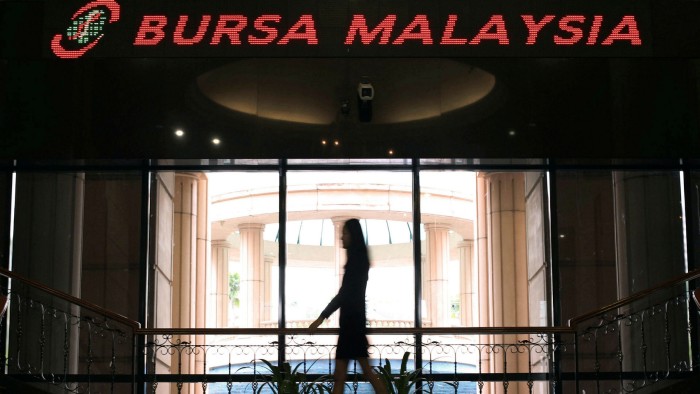‘Crazy’ Malaysian bull market prompts exchange to consider curbs

Roula Khalaf, Editor of the FT, selects her favourite stories in this weekly newsletter.
Frantic buying by Malaysian retail investors of hot stocks such as rubber glove makers has driven trading volumes on the country’s stock exchange to record highs, prompting the bourse to consider steps to curb the frenzy.
Trading volumes this year for members of the FSTE Bursa Malaysia Top 100 index are the highest on record since the benchmark tracking the country’s largest stocks was created in 2006, according to Bloomberg data. Turnover in the year to date has already topped last year’s total by 20 per cent at more than 143.8bn ringgit ($34.5bn).
Much of the surge has come from a torrent of non-professional investors who have driven about 45 per cent of turnover, according to estimates from Hong Kong brokerage CLSA.
Individuals are “punting like crazy”, said Gerald Ambrose, head of Aberdeen Standard Investments Malaysia, who likened the trend to the super bull run ahead of the Asian financial crisis in the 1990s.
Retail traders had for the past three years made up less than 20 per cent of daily volumes, according to Aberdeen.
The rush of retail buying has helped the benchmark FTSE Bursa Malaysia Kuala Lumpur Composite index to erase heavy losses incurred during a sell-off in March, leaving the benchmark down just 1 per cent for the year.
“It is the first time in a long time here people see an opportunity to make a quick buck,” Mr Ambrose said.
Bursa Malaysia, whose shares are up about 70 per cent this year, told the Financial Times it was monitoring the situation and had “various tools” to manage excessive speculation and irregular trading — including market alerts and stopping traders gearing up to purchase stocks through “designating” securities.
“While we continue to drive more retail participation in our marketplace, we are also pursuing a focus to raise the level of investment savviness amongst Malaysians,” the exchange said in a statement.
Tushar Mohata, an analyst with Nomura in Kuala Lumpur, said the bourse hoped increased retail activity would continue instead of receding as with previous surges.
“Bursa has done a lot of initiatives over the years to promote retail investor education,” Mr Mohata said. He pointed to websites set up by the exchange to explain investment basics, and its provision of subsidies for research on smaller market-cap companies that are popular with retail investors but ignored by most research houses.
The south-east Asian country’s bull market has run alongside a global rally for equities, especially medical stocks, even as economies are hit by the Covid-19 pandemic. Malaysia reported this month that its economy had contracted by the most since 1998 in the second quarter.
In April, after the coronavirus crisis struck Malaysia, the government told banks to offer a moratorium for many borrowers. Instead of saving, people stuck at home in lockdown began trading.
Rakuten Trade, an online equities broker launched in 2017, reported a surge in account openings during government-imposed lockdown. Between March 18 to June 30 this year, the company, a joint venture between Malaysian investment bank Kenanga Investment Bank Berhad and Japan’s Rakuten Securities, established almost 50,000 new accounts — half of its current total.
Jingyi Pan, a market strategist at IG in Singapore, said the speculative frenzy was most visible in stocks that had benefited from the coronavirus crisis, including the big four rubber-glove makers: Top Glove, Supermax, Kossan Rubber Industries and Hartalega.
Shares in Top Glove alone have risen more than 480 per cent in the year to date, with gains at the big four glove makers adding 38.5bn ringgit ($9.2bn) to their combined market capitalisation.
Mr Mohata at Nomura said glove makers and other healthcare stocks popular with retail investors accounted for 17 per cent of total turnover this year, more than any other sector and up from just 4 per cent in 2019.
Shares in gold-related companies have also soared alongside a recent rally for the precious metal, including jewellers Poh Kong and Tomei, as well as MUI Properties, which owns a large stake in an Australian gold miner.
The stock price of little known, lossmaking jewellery company Niche Capital Emas jumped 520 per cent to an 11-year high this month.
But analysts said there were looming risks to the retail rally, including the end of the loan payments moratorium in October and any progress in the development of a coronavirus vaccine.
Mr Mohata said while global markets might cheer the creation of a successful vaccine, “stocks which directly or indirectly have benefited from the pandemic like gloves and gold names — those can reverse”.
Comments